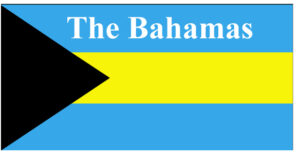 The education system of the Bahamas is based upon the British education system and is supported by the Ministry of Education. As of 2008 there were 206 schools in the system of which 161 were fully maintained by the government. Government schools do not require tuition however the quality of education is not viewed to be on par with that of the private schools.
The education system of the Bahamas is based upon the British education system and is supported by the Ministry of Education. As of 2008 there were 206 schools in the system of which 161 were fully maintained by the government. Government schools do not require tuition however the quality of education is not viewed to be on par with that of the private schools.
School attendance is mandatory for ages 5 to 16 and due to this and the government’s continued efforts to improve education; the Bahamas has a literacy rate of 95%. Primary education consists of pre-school and grades 1-6 (ages 3 to 11+), junior high school covers grades 7-9 (Ages 11+ to 14+), and senior high school covers grades 10-12 (ages 14+ to 16+). The Bahamas also has high educational indicators with both primary and secondary education enrollment rates of 92%.
Bahamian secondary students take the Bahamas General Certificate of Secondary Education (BGCSE) to demonstrate whether they are prepared to advance on to higher education. The BGCSE grading scale is as follows:
|
Grade |
Description |
Category |
|---|---|---|
|
A |
Knowledge is specific, appropriate and comprehensive; evidence of exceptional comprehension skills, and outstanding high order skills – problem solving and critical thinking skills. |
Above Average |
|
B |
Knowledge is specific, appropriate and comprehensive; evidence of exceptional comprehension skills; very good high-order, problem-solving, critical thinking skills. |
Above Average |
|
C |
Knowledge is specific and appropriate to the task – evidence of sound comprehension skills; good high–order, problem-solving skills |
Above Average |
|
D |
Knowledge is specific and appropriate to the task – comprehension evident, critical thinking / problem-solving skills satisfactory. |
Average |
|
E |
General basic knowledge exhibited, also evidence of ability to comprehend this knowledge and limited problem solving skills. |
Below Average |
|
F |
Basic knowledge still limited – goes beyond the recall, recognition level to show some understanding of this basic knowledge; very limited problem–solving skills evident. |
Below Average |
|
G |
Limited basic knowledge about the tasks required and only at the recall or recognition level – with no comprehension and no problem-solving skills evident. |
Below Average |
|
U |
Candidate has failed to show positive achievement in the subject. |
|
Grading scales for tertiary education vary depending on the institution. The following is the grading scale for the largest institution, the College of the Bahamas.
|
Letter |
Points |
Percentage |
|---|---|---|
|
A |
4.00 |
90-100 |
|
A |
3.75 |
85-89 |
|
B+ |
3.50 |
80-84 |
|
B |
3.00 |
75-79 |
|
B |
2.75 |
70-74 |
|
C+ |
2.50 |
65-69 |
|
C |
2.00 |
60-64 |
|
C |
1.75 |
55-59 |
|
D |
1.00 |
50-54 |
|
F |
0.00 |
0-49 |
The most recent curriculum revision by the Department of Education of the Bahamas took place and set to “provide current, age-appropriate, relevant, and quality curriculum guides for all subjects at the three levels of schooling.” For all three levels, the main subjects that are studied are language arts, mathematics, general science, biology, secondary language arts, religious studies, and health and family life education.
The College of the Bahamas is the primary provider of postsecondary education in the Bahamas. Other schools include a branch of the University of the West Indies (UWI) and the Bahamas Technical and Vocational Institute (BTVI). Accreditation for higher education institutions in the Bahamas is regulated by the Caribbean Accreditation Authority in Medicine and other Health Professions (CAAM-HP) which accredits medical, dental, veterinary, and other health professions education programs, and the Ministry of Education and Training which accredits all other programs.
Common credentials earned in the Bahamas for secondary and postsecondary education are the BGSCE, Associate’s degrees, and Bachelor’s degrees. The BGSCE is earned following the successful completion of secondary education and by passing the BGSCE examination; it allows access to postsecondary education. Associate’s degrees are earned in Applied Science, Arts, and Science, and are generally two-year programs awarded by the College of the Bahamas. Bachelor’s degrees are awarded in Arts and Science and are generally four-year programs.
© 2025 Gaetranslations | Terms & Conditions
Website by: Timefortheweb